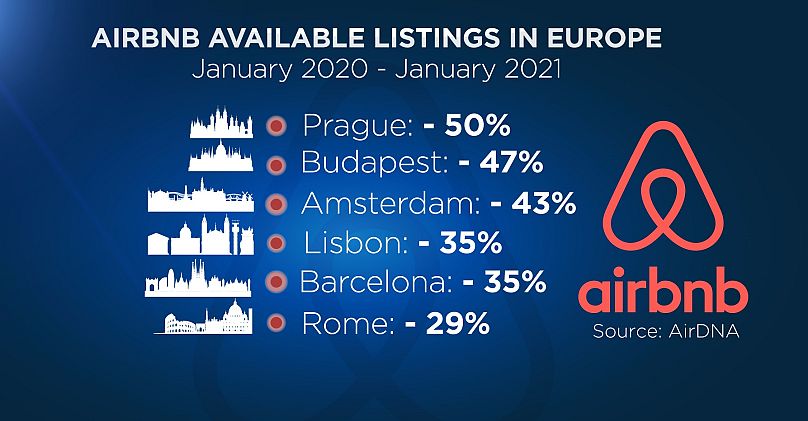"Many owners decided to withdraw their accommodation from the short-term rental market and put them on the long-term rental market," one expert told Euronews.
Where regulators have failed, the pandemic has succeeded.
With countries imposing severe travel restrictions and virus variants spreading across borders, landlords on Airbnb are ditching short-term stays for tourists and betting instead on long-term rentals for residents.
The shift in preference has hit the company hard.
In 2020, revenues plunged by 30% compared to 2019, from $4.8 billion to $3.4 bn (from €4.07 bn to €2.89 bn).
The two-digit drop, however, didn't deter the platform from going public on Wall Street. Back in December, shares were initially offered at $68 each and have since tripled the value, although they have gone through several ups-and-downs.
Airbnb is now hoping last year's market volatility and consumer reticence gives way to a strong tourist rebound in 2021, powered by widespread vaccination.
But the extreme impact of COVID-19, which has altered virtually all aspects of life, could turn temporary changes into permanent behaviours.
"Many owners decided to withdraw their accommodation from the short-term rental market and put them on the long-term rental market," Mario Breglia, president of Scenari Immobiliari, an independent research centre focused on property, told Euronews.
"There was a sudden increase in the supply of rental houses in Italy that we haven't seen for decades. The owners made their calculations and preferred to earn a little lower over a year, but with a good tenant who always pays."
Popular European destinations such as Budapest, Rome and Amsterdam are seeing steep declines in the numbers of Airbnb listings available. In Prague, listings dropped by 50% in 2020, according to AirDNA analytics.
Rise and backlash
Since its launch in 2008, Airbnb has become the go-to website for affordable accommodation. Its worldwide popularity is two-fold: on the one hand, it offers budget-conscious travellers options that are significantly cheaper than hotels; and on the other, it provides landlords with an easy way to make money from their properties.
Airbnb, which stands for "Airbed and Breakfast", is currently available in 100,000 cities in over 220 countries and regions around the world. The platform has around 5.6 million active listings and 4 million hosts (landlords). According to the company's data, each Airbnb host earns an average of $7,900 (€6,710) per year.
But as its popularity and name recognition grew, so did the potential for a backlash.
The expansion of Airbnb accommodations for tourists has been linked to a pronounced rise in rent prices for residents, particularly in Western capitals and other big cities. A 2019 study by the Harvard Review Business found that "a 1% increase in Airbnb listings is causally associated with a 0.018% increase in rental rates and a 0.026% increase in house prices".
Considering that the company's year-on-year average growth is about 44%, "this means that, in aggregate, the growth in home-sharing through Airbnb contributes to about one-fifth of the average annual increase in US rents," the study said.
Cities such as Paris, Barcelona, Berlin and New York City have already introduced measures and regulations to limit how many short-term listings each landlord can offer and how many days these rentals can last.
The backlash against the company is similar to other confrontations between digital and traditional companies, such as taxi drivers versus Uber, newspapers versus Facebook, and cinema theatres versus Netflix.
Airbnb defends itself by arguing that its business model "directly benefits the communities", helps landlords pay their bills and enables tourists to spend more money on local businesses.
The European countries that saw the largest economic benefit in 2018 were France ($10.8 billion), Spain ($6.9 billion), Italy ($6.4 billion), the United Kingdom ($5.6 billion), Portugal ($2.3 billion), Germany ($2.3 billion), Greece ($1.4 billion) and the Netherlands ($1.3 billion), the company estimates.
Tourism-reliant countries like Spain and Greece are now leading the cause for an EU-wide vaccine passport, which the European Commission introduced - significantly modified - in early March with the goal to have it operational before the summer. The green pass is set to help the travel industry, including Airbnb and other hospitality services, bounce back after a calamitous 2020.
Affordable public housing
The debate is now focused on how to co-exist with Airbnb, whose main intention is to keep growing, and how to palliate its detrimental side effects.
The International Union of Tenants argues that European governments should use the money from the EU's €750 billion recovery fund to follow the example set by Lisbon and Barcelona. As two of the most attractive destinations in Europe, both cities have been increasingly assaulted by the so-called "hit-and-run tourism", a term that applies to brief and intense stays.
Seeing that rent prices were becoming prohibitively expensive, local councils in Lisbon and Barcelona began buying houses available on Airbnb and turning them into social housing.
"We have now a massive amount of money coming to the European states to start up their economies. Many of them believe that this is the opportunity to change the entire housing market and use the EU [recovery fund] money to set up a non-profit housing sector towards a more affordable long-term housing," said Barbara Steenbergen, member of the Executive Committee at International Union of Tenants.
However, EU competition law only allows public investment in housing for low-income earners, leaving out the middle class, who also suffer from unsustainable rent prices across the continent.
Members of the European Parliament are urging the European Commission and national governments to take action and recognise "access to decent and affordable housing as an enforceable human right".
"Housing is considered affordable if the occupant’s remaining budget is at least sufficient to cover other essential expenditure. While this threshold is currently set at 40%, more than a quarter of European tenants in commercial housing spend a higher percentage of their income on rent," the lawmakers said in a resolution adopted in January.
In a thinly veiled attack on Airbnb, MEPs pointed out that "the expansive growth of short-term holiday rental is removing housing from the market and driving up prices, and can have a negative impact on liveability in urban and tourist centres" and asked the Commission to give wide discretion to national and local authorities to "define proportionate rules for hospitality services".
The text received 352 votes in favour, 179 against and 152 abstentions.
Leïla Chaibi, a French MEP who sits with The Left group, was one of those who supported the resolution.
"When you allow investment in affordable public housing, you are essentially influencing private stock because it lowers the price. You have the advantage of low-rental housing on the market, so I think that's the main tool to use," Chaibi told Euronews.

